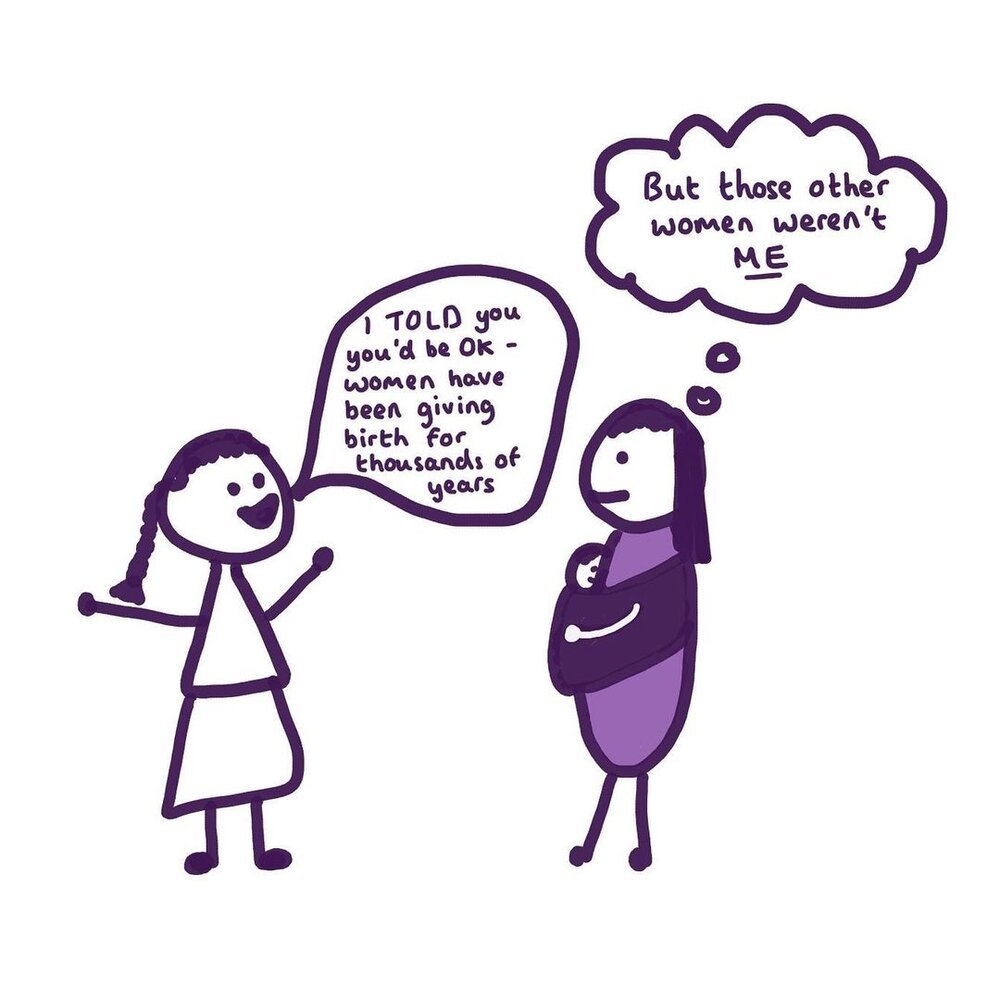Birth debrief
For most women, birth is a positive experience. However, it can also be very confronting or traumatic for mothers and partners. Birth can leave physical or psychological wounds that have a lasting impact on a family’s life and due to stigma, many women suffer for a long time before seeking help. This can lead to difficulty with breastfeeding, feelings of fear, anger, guilt or detachment from their baby or partner, and anxiety about future pregnancies.
Conversations about what happened with someone who understands maternity care can help bring closure to a traumatic experience. Discussions about obstetric interventions and implications for the future can help you to plan for next time if that's important.
Some people don't feel traumatised by their birth events but can't recall what happened. Incomplete memories are a frequent experience after a traumatic event - it's your brain's way of protecting itself from harm. Later, however, processing these events requires some clarity to help complete the story and understand what happened. Sometimes after trauma, our brains attempt to 'fill in the gaps', which can lead to more confusion.
What happens during the consultation?
Standard first consultations are 40 minutes long, and subsequent ones are 20 minutes, although you can book a long appointment at any time. Typically during the first consultation, we discuss what happened with your birth or what has affected you afterwards. The following steps are up to you, but this can involve:
Gaining access to your hospital birth records. To do this, you must sign a release form which will be forwarded to the hospital where your birth occurred. You will receive copies of any records if you wish. If you feel that having these to hand before our first visit is essential, please contact admin@dannytucker.net, and we can start that process.
Explanations about the events that took place - answering questions about what happened, why interventions or procedures took place and clarity about how it fits into the bigger picture of a safe birth - both physically and psychologically.
A conversation about the implications of what happened for subsequent pregnancies or health in the future can include advice about preparing a Perinatal Plan for next time if relevant.
Referral or recommendations about appropriate professionals to support your ongoing physical and mental health recovery
What if I need more help?
Some women may have already accessed psychological support, and our conversations will help with understanding and recovery in collaboration with your chosen health professional.
Birth trauma or birth-related distress is a complex area, and a combined approach will help you deal with emotions and feelings that may surface and can promote healthy healing. Psychological therapy offers a space for you to prepare, manage the feelings that may arise, and help you understand and process them.
If you need a psychologist, Danny works with Melissa Freestun from Self Psychology as part of a multidisciplinary support program. You can find more information about the program here. I’ve written more about psychological birth trauma here.
If you have physical injuries that have not healed, please make an appointment to see me for an assessment and treatment plan.
Access a birth debrief
A birth debrief may be accessed as part of a program including a perinatal-trained psychologist, which has benefits beyond simply receiving more information about your baby’s birth. A psychologist can help with preparing for the birth discussion and strategies for dealing with symptoms that might be present, either before or after the birth conversation.
Danny works with Melissa Freestun from Self Psychology, offering the following program. Sessions are 40-50 minutes duration each.
Visit 1: Melissa - intake, review of current symptoms relating to birth, which may include screening questionnaires and goal setting. This could take more than one session.
Visit 2: Melissa - preparation for birth debrief and strategies to prepare for emotions and feelings that might arise. Consideration of ways to support your well-being during and after the debrief.
Visit 3: Danny - birth debrief
Visit 4: Danny - birth debrief and planning for next time if relevant. Some women may not need two sessions; others may need more.
Visits 5 onwards: Melissa - ongoing therapy to help process what you have learned, manage new and long-standing symptoms, bring healing to your birth experience and explore your vision of parenthood. The number of sessions will be determined by your own goals and needs with the intention of strengthening the bond with your baby, improved family wellbeing and self-compassion.
Getting started
To access the program or a birth debrief with Dr Danny Tucker, please see more information below. Telehealth is an option if travel is difficult or you do not live in Townsville. If you have questions, please get in touch via admin@dannytucker.net
Two steps are required for the joint psychology/obstetrician program are as follows.
If you only wish a birth debrief consultation without the support of the psychology program, please complete step 1 only.
1. GP referral to Dr Danny Tucker
See appointments page for where to send referrals.
2. GP referral to Melissa Freestun
You will also need a GP referral to Melissa Freestun. For Medicare rebates, your GP will prepare a Mental Health Treatment Plan, which provides access to 10 sessions per year.
Melissa Freestun MAPS
Fax: 07 2000 4411 or email: admin@selfpsychology.com.au
FEES AND MEDICARE REBATES
Standard therapy and debrief fees are outlined Danny: here and Melissa: here.
Further information about the psychology component can be found on Melissa’s website at: www.self-psychology.com.au
Image used with kind permission of 4am_doodles.

